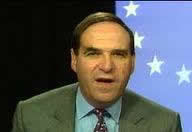During the negotiations for the Financial Services Agreement, the US Coalition of Service Industries (CSI) got together with British Invisibles (BI) to form the Financial Leaders Group (FLG) in 1996. The group includes financial leaders from Europe, North America, Japan and Hong Kong representing such banking giants as Barclays, Chase Manhattan, Goldman Sachs, the Bank of Tokyo-Mitsubishi. FLG broadened support for financial services deregulation and ‘proved a key player in securing the 1997 Financial Services Agreement’.
 The formation of FLG was encouraged by EU Trade Commissioner Leon Brittan (pictured). During the negotiations Brittan, who had ‘learned from the negotiations the importance of the American private sector in advising the US administration on deal-making’, encouraged ‘the European private sector to make contact with their counterparts across the Atlantic so as to build up a partnership in favour of a permanent deal.’ He played a key role in the formation of the TransAtlantic Business Dialogue (TABD) in 1995 which enables the CEOs of US and European companies to present a unified and powerful front to trade negotiators. As EC Vice President, Brittan met regularly with TABD. When the Financial Services Agreement (FSA) was made in 1997, Brittan claimed his strategy had ‘paid off handsomely.’
The formation of FLG was encouraged by EU Trade Commissioner Leon Brittan (pictured). During the negotiations Brittan, who had ‘learned from the negotiations the importance of the American private sector in advising the US administration on deal-making’, encouraged ‘the European private sector to make contact with their counterparts across the Atlantic so as to build up a partnership in favour of a permanent deal.’ He played a key role in the formation of the TransAtlantic Business Dialogue (TABD) in 1995 which enables the CEOs of US and European companies to present a unified and powerful front to trade negotiators. As EC Vice President, Brittan met regularly with TABD. When the Financial Services Agreement (FSA) was made in 1997, Brittan claimed his strategy had ‘paid off handsomely.’
The creation of FLG was also ‘spurred by the World Economic Forum, which has been the catalyst for key international meetings among US and EC negotiators, and business representatives.’ Banker Andrew Buxton, from BI’s LOTIS committee, became co-chair of FLG with Ken Whipple, President of Ford Financial Services and chair of the Financial Services Group of CSI. Whipple had decided that ‘success in financial services negotiations would be more likely were financial leaders here [in the US] and in Europe to work together to ensure a success.’
FLG’s success with the Financial Services Agreement was partly attributed to its structure. FLG consists of two tiers: a high level group of CEOs and chairpeople of corporations, supported by a Financial Leaders Working Group with lower level corporate executives. FLG relies on the power of this coalition of corporate heavy weights in its high level group to have influence:
The unanimity in the Financial Leaders Group became a message to governments that the US and European financial community wanted meaningful liberalization and a substantial success, and that the negotiators should co-operate to achieve it. The strategy clearly worked.